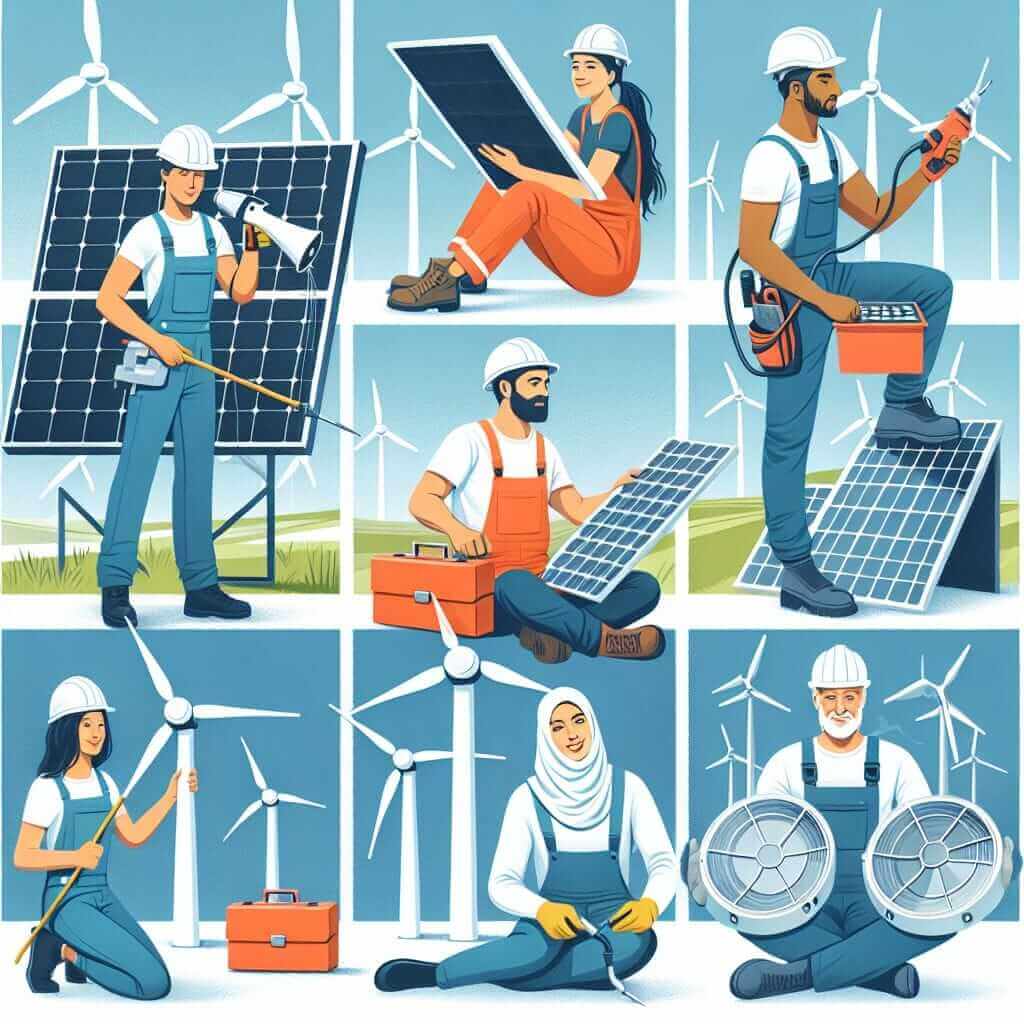The IELTS Reading test is a pivotal part of the IELTS examination, assessing your ability to read and comprehend passages of varying complexity. Over the years, the subject of renewable energy has emerged frequently in the IELTS Reading test, reflecting its growing relevance in today’s world. This article explores how renewable energy impacts job markets, presenting a practice reading passage, questions, and detailed explanations to help you prepare effectively.
Reading Passage
The following is a medium-level reading passage created to mimic the IELTS test structure:
Renewable Energy and Its Impact on Job Markets
Renewable energy has become a significant focal point for economies worldwide as nations strive to reduce their carbon footprints and transition to sustainable sources. This shift has not only spurred technological advancements but also profoundly impacted global job markets. The rise of renewable energy sectors such as wind, solar, and bioenergy has created millions of jobs, offering new opportunities in research, manufacturing, installation, and maintenance.

In 2020, the International Renewable Energy Agency (IRENA) reported that renewable energy industries employed over 11 million people globally. A large portion of these jobs is found in the solar photovoltaic (PV) sector, which accounted for nearly one-third of the total renewable energy jobs. Countries like China, the United States, and Germany have seen a significant uptick in employment within these sectors due to favorable government policies and substantial investments.
Moreover, the transition to renewable energy is not merely a matter of creating new jobs but also involves reskilling the workforce. Traditional energy sectors, including oil and coal, are witnessing job declines. Workers from these industries often need to acquire new skills to transition into renewable energy roles. Training programs and educational initiatives are being developed worldwide to facilitate this workforce shift.
Interestingly, renewable energy jobs are also more inclusive. Reports indicate that there is a higher representation of women in renewable energy sectors compared to conventional energy industries. This inclusivity is partly due to progressive workplace policies and a growing emphasis on diversity.
Nonetheless, there are challenges to this transition. The geographic distribution of renewable energy jobs can be uneven, favoring regions with abundant natural resources or advanced technological infrastructure. Furthermore, the initial capital required for setting up renewable energy projects can be high, posing a barrier to entry for developing nations.
In conclusion, renewable energy is reshaping job markets around the globe, presenting both opportunities and challenges. Governments and businesses must collaborate to ensure a smooth transition, promoting policies that foster job creation and workforce reskilling in this burgeoning sector.
Practice Questions
Questions 1-5
Choose the correct letter, A, B, C, or D.
-
According to the passage, which renewable energy sector employs the most people?
- A. Wind energy
- B. Biomass energy
- C. Solar photovoltaic (PV) energy
- D. Hydropower
-
What has contributed to increased employment in renewable energy sectors in certain countries?
- A. High electricity prices
- B. Favorable climate conditions
- C. Government policies and investments
- D. Decline in traditional energy sectors
-
What challenge does the passage mention regarding the geographic distribution of renewable energy jobs?
- A. Lack of skilled workforce
- B. High operational costs
- C. Uneven distribution favoring resource-rich regions
- D. Political instability
-
How does the renewable energy sector compare to conventional energy industries in terms of workforce diversity?
- A. Less inclusive
- B. More inclusive
- C. No difference
- D. Less skilled
-
What is necessary for workers transitioning from traditional energy sectors to renewable energy roles?
- A. Higher educational degrees
- B. More financial investment
- C. Reskilling and training programs
- D. Political support
Questions 6-10
Do the following statements agree with the information given in the passage? Write:
- True if the statement agrees with the information
- False if the statement contradicts the information
- Not Given if there is no information on this
- In 2020, IRENA reported over 12 million jobs in the renewable energy sector.
- Oil and coal workers are naturally transitioning to renewable energy roles without the need for reskilling.
- The passage states that developing nations face high initial costs for renewable energy projects.
- Women have fewer opportunities in renewable energy jobs compared to traditional energy sectors.
- Renewable energy job opportunities are uniformly distributed globally.
Answer Key
Multiple Choice Answers
- C
- C
- C
- B
- C
True/False/Not Given Answers
- False – The passage states “over 11 million” not 12 million.
- False – Workers need to “acquire new skills to transition.”
- True – The passage mentions “high initial capital required.”
- False – The passage indicates higher representation of women.
- False – It mentions uneven distribution favoring certain regions.
Common Mistakes
- Misreading Numbers: Pay close attention to the details and figures mentioned in the passage.
- True/False/Not Given Questions: Ensure you distinguish between “No Information” and “False”.
- Paraphrasing: Recognize that questions may rephrase the information from the passage.
Vocabulary
- Photovoltaic (PV) (/ˌfəʊtəʊˌvɒltəɪk/): Adjective relating to the conversion of light into electricity.
- Reskilling (/ˌriːˈskɪlɪŋ/): Noun the process of learning new skills so you can do a different job.
- Inclusivity (/ɪnˌkljuːˈsɪvɪti/): Noun the quality of including many different types of people and treating them all fairly and equally.
Grammar
Passive Voice
Passive voice is often used in IELTS reading passages to emphasize the action rather than the subject.
- Active Voice: “The government invested in renewable energy.”
- Passive Voice: “Investments in renewable energy were made by the government.”
Tips for High Reading Scores
- Practice Regularly: Use diverse reading materials to build and maintain your reading skills.
- Time Management: Develop strategies for managing the time allotted for each passage.
- Understand Question Types: Familiarize yourself with different types of IELTS reading questions.
- Expand Vocabulary: Learn and practice high-frequency academic vocabulary.
Ensure you review and practice these strategies and tips as part of your preparation to achieve your desired IELTS Reading score.